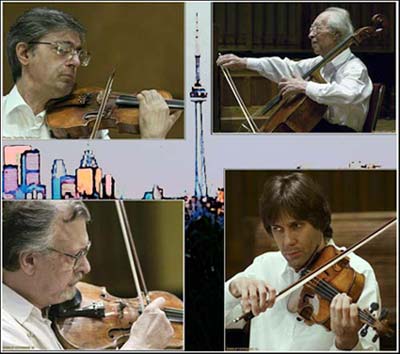 |
Borodin Quartet
presented by Show One Productions |
| November 17, 2005 • George Weston Recital Hall • Toronto |
|
|
Music that Liberates Itself
by Stanley Fefferman |
Dmitri Shostakovich (1906–1975), String Quartet No.8, in C minor, Op 110 (1960).
This composition has generated over 100 commercial recordings during the past 45 years since its first performance was greeted with a standing ovation, as was this night’s performance by the Borodins in the acoustic splendour of George Weston Hall. How to explain the ongoing popularity of a work said to have been inspired by Shostakovich’s visit to the bombed out city of Dresden, rumoured to be the composer’s suicide note on the occasion of his being forced to join the Communist Party, and described in the composer’s own words as “a Russian song to the memory of the victims of the revolution”? I like the explanation David Fanning gives in his book Shostakovich: String Quartet No.8: where he says it is “music that liberates itself from the shackles of contexts.”
|
| The emotion is direct, the musical elements are vivid, the themes are powerfully integrated, the Borodins' breathtaking performance carries this “Russian song” directly into the heart of the listener. From the opening bars of Valentin Berlinsky’s cello in the first ‘Largo’ as it blends into an organ-toned harmony with its fellows, through the frantic, locomotive nightmare chase, to the third movement, with Aharonian’s arresting violin opening and Shostakovich’s signature DSCH theme which sticks in your head, and onward toward the somnolent final bars, we are compelled by Borodin’s execution of dynamics, ranging the subtle grades from zephyr to thunder, to feel and to keep feeling, till we are done. |
|
 |
|
Ludwig Van Beethoven (1770–1827) String Quartet No.11 in F minor Op.95, “Serioso” (1810)
The first movement begins with a dramatic outburst and ends in a whisper. This is Beethoven’s art, alternating moments of energy with moments of reflection, passages of drama with passages of lyricism, rhapsodies to richness and serenades to simplicity, balancing the antinomies embracing each other in the love of nature. Perhaps it was the superb acoustics of the hall, or the uncannily subtle modulations of the Borodins' touch, but they managed to generate such a vivid, multilayered soundstage during the ‘allegro agitato’ towards the end of the fourth movement, I was momentarily overtaken by the illusion someone had just switched on the 7.1 surround system.
Alexander Borodin (1833–1887) String Quartet No.1 In A major (1879)
The opening melancholy theme, borrowed from Beethoven, is Borodin’s first attempt to find a “particularly Russian response to the string quartet medium where no tradition existed”. The movement develops a series of lovely undulating melodies which flow into the dramatic third movement, where the Borodin Quartet astonish with their lightly touched liquid crystal bell tones. In the fourth movement, one hears the soft whispers of various breezes, and in them the wistful passage of time that continues to pass no matter how finely its moments are attenuated by musical notation. On this ground, the energy of the movement increases as it approaches the end, into a dance that struts, leaps and whirls.
The Borodin String Quartet, the world’s longest lived string quartet, founded in 1945, is unquestionably one of the great musical ensembles of the 20th Century. Valentin Berlinsky, who led with his cello for us this night, has been there all this time. It is a great honour for Toronto that the Borodin’s 60th anniversary world tour should conclude here. If only they would come back, soon.
|
|
|
|
|
|
|


